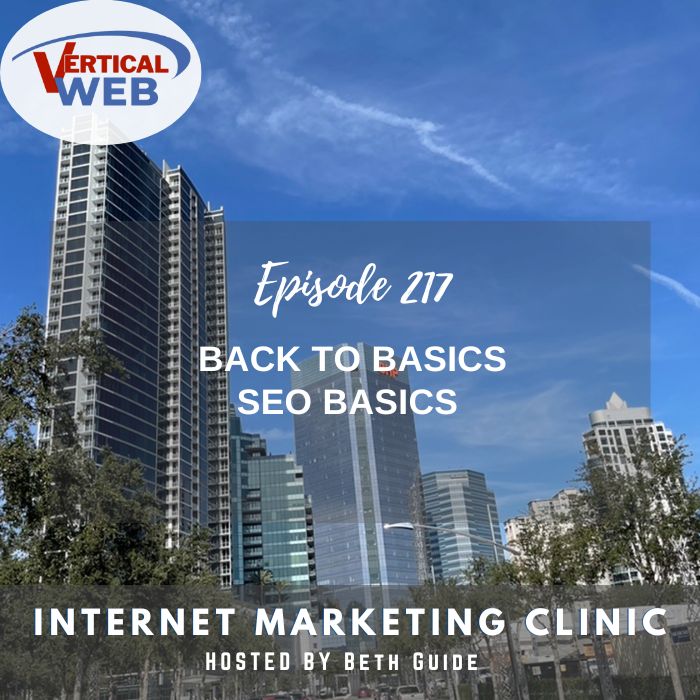Subscribe to Our Podcast Apple Podcasts | RSS
Subscribe to Our Podcast Apple Podcasts | RSS
Search engine optimization (SEO) is one of the primary components of digital marketing and is foundational to a successful website. Proper SEO gives your website the best possible chance at securing favorable search engine listings, and those top listings are valuable. In fact, the top 3 organic listings in Google gets an estimated 80 percent of all the clicks on a particular search engine results page (SERP).
As your site moves up the rankings, its ability to attract traffic will also improve. That means more potential customers and, if your website’s effective at converting, more business.
SEO is important, so we’re going back to the basics this week and covering search engine optimization 101.
Understanding Google’s Algorithm
At its core, Google is an index, a directory. Google is a list of millions upon millions of websites that users reference when they need to answer a question. That query could be for a piece of information, for product reviews or for a business, but it always starts with a query.
Google’s job as a search engine is to match the best answer to each query. To do this, Google utilizes a mathematical formula – an algorithm – to assess every website and page it comes across. This algorithm weighs hundreds of factors to determine whether a particular page is worth showing for a particular query.
SEO is designed to make a website or page as attractive as possible to Google’s ranking algorithm. This means optimizing many ranking signals that tell Google that “hey, this website is worth considering for that question.”
Organic vs. Paid Listings
Organic listings are listings that have earned their spot through effective SEO practices. Websites that land a top organic listing have earned the favor of Google’s algorithm by optimizing factors like content, link building, page speeds, user experience and many others. SEO services provide the work needed to optimize those signals.
Paid listings compete with organic listings for top SERP listings, but do so by paying Google instead of optimizing ranking signals. While traffic can be earned this way, it can be extremely expensive to manage and is considered less effective than winning organic traffic.

How Does Google Find New Pages?
Google finds new pages by “spidering” the internet. Google’s spiders explore the internet by navigating from link to link. Those spiders may follow internal links from one part of a site to another, or they may hop on an outbound link to another website.
When spiders “crawl” new pages, they analyze it by looking at various signals and determining what it’s about. If the page is worth saving for future listing purposes, Google indexes the page, which means it stores it in a massive directory for possible future reference.
One of the primary ways Google locates new pages and content is through the use of a sitemap. Sitemaps are documents that provide Google’s spiders with all the information they need to efficiently crawl your website – specifically the URLs contained in your site. This helps spiders build a more complete picture of your site and ensure deeper crawling.
Submit Your Sitemap via Search Console
Sitemaps are XML feeds that are easily generated with an SEO plugin like RankMath and can be submitted directly to Google. They are generally regarded as a requirement you must complete for your website to be indexed properly in Google.
Fresh Content Always Performs Better
Content includes the most important ranking signals for any page. One of those signals is the “freshness” of your content, and Google has directly confirmed this.
The freshness of your content refers to its timeliness or how recently it has been updated. Content that’s written in relation to a current event, for example, will achieve better freshness scores. Likewise, if you update large parts of an older page, Google will also view it as fresher.
Fresh pages are more likely to be crawled and indexed, so regularly updating your site’s content is a proven way to get more pages indexed.
Choose Standard Web Hosting over Platform-based Web Hosting
Your web hosting company has a major impact on your website’s SEO viability. With standard shared hosting or dedicated hosting services, your website has its own space on one of your host’s web servers. It’s like owning a home – you have additional room to make changes to your website and you don’t have to share infrastructure with other sites.
With platform-based hosting, it’s like renting an apartment. Your capacity to make changes is limited, and if you have bad neighbors (online businesses doing shady stuff that is sharing your hosting platform), that will attract the wrong kind of attention from Google. For maximum control over your site’s performance, dedicated servers are always recommended.
Why HTTPS is always a Must
It’s important, that your website has the HTTPS protocol in place. HTTPS is just like standard HTTP, except that all data is encrypted before it is sent. Google has incentivized HTTPS websites over their non https counterparts. Therefore any serious website needs to make sure their website is showing secure
HTTPS should be available through your web host and the best web hosting company, add a free SSL with all accounts.
How to Properly Use Tags (Title, Description & Header)
Every page on your website should come with a primary title tag, that states clearly what the objective of a page is. In addition, use of the header tag system should be used, starting with an H1 tag that directly describes what that page is about. If the page is about accounting services, the H1 should reference accounting services that may be accompanied by local terms like Houston or West Houston, if a business is localized.
From here, additional header tags should descend in importance. So if the page’s H1 is “accounting services in Houston,” then the H2s may be “business accounting services” and “Personal Tax Services.” By adding these signals to a page, it provides Google an overview of what the writer believes is the most important to least important topics on a page by weighting the headers.
Every page can store a meta description that explains what that page is about. This information is presented on Google’s SERPs along with your listing. Through WordPress, every page has a field for a meta description, and you’ve got a few sentences to work with.
Your meta description should be aimed at users primarily. Stuffing keywords in your meta description is ineffective, so write it in a way that compels people to click on your listing.
Why Is SEO Important?
There are around 20 million e-commerce websites on the internet, with more being added every day. Competing with so many sites is a daunting task, but it’s doable with effective SEO in place. With the above concepts and tips, you can get started on implementing that SEO and giving your business a better chance of online success.
- Last Call for Today’s Class– Getting Your Business on the Map - October 23, 2024
- SEO Class This Week – Getting Your Business on the Map - October 22, 2024
- October 2024 Internet Marketing Clinic Schedule - October 10, 2024
Related posts:
- On Demand SEO Classes
- Houston SEO Company | Vertical Web is Houston Expert SEO Services
- How Technical SEO Impacts How Your Site Rankings
- Compare Our Plans
- Windows Update Update (no typos here)
- Free SEO Audit for Small Business from Houston SEO Expert Vertical Web and Beth Guide
- Basic SEO Maintenance: Five Simple Things Site Owners Can Do to Improve SEO
- The Right Tools for the Job: How to Get WordPress Set Up for Business Websites
- What Makes For A Search Engine Friendly Website?
- Why a CMS is a Must for Any Website


